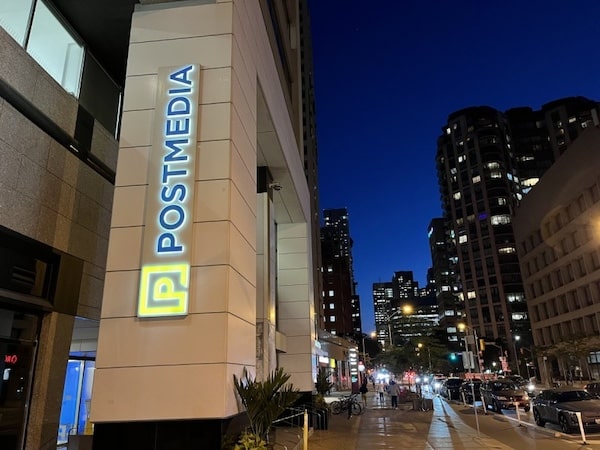While it’s strange that anyone claiming to be a journalist would boast about working with the intelligence agency of a foreign state, National Post columnist Adam Zivo is certainly not the first international correspondent to have flouted journalism ethics by directly engaging in counterintelligence operations while on the job.
On August 9, Zivo claimed on X that in 2022 he had organized a sting operation with the Security Service of Ukraine, or SBU, the country’s spy agency. Zivo said someone he noticed “speaking English loudly” at a mall in Odessa seemed suspicious and so he invited Ukrainian intelligence operatives to observe a dinner he later organized with the individual and his wife. Little came of the undercover op in which Zivo wore a wire to catch the suspected Chinese spy.
PressProgress Editor Luke LeBrun asked the National Post about the matter, but the paper’s representatives ignored his inquiries, seemingly indifferent to one of their staffer’s admitted collaboration with the spy agency of a country from which he’s submitted dozens of articles since Russia’s invasion in February 2022 (Zivo was sanctioned by the Kremlin that same year).
People are dunking on this tweet but this actually happened to me in Odesa in early 2023 with a guy who seemed to be a Chinese spy. I ended up organizing a small sting operation with two Ukrainian intelligence officers to figure out what his deal was. https://t.co/UtyFcpVCZo
— Adam Zivo (@ZivoAdam) August 10, 2024
The ‘Zivo affair’ is an odd tale, but it’s not unheard of for Canadian war correspondents to have ties to intelligence agencies, as I detailed in my 2016 book, A Propaganda System. In 1976 a U.S. Senate Intelligence Committee documented close links between the CIA and journalists, showing how agents wrote Associated Press stories and conducted journalism training. In his 1980 book, the Toronto Star’s Jack Cahill, “one of the best Canadian foreign correspondents of the 1970s,” describes bunking with a CIA agent during the 1975 U.S. evacuation from Saigon. Cahill notes he was “debriefed by American intelligence and it had never occurred to me not to tell them everything I knew.”
Other leading foreign correspondents reported close ties to the U.S. and Canadian military establishments. A CBC TV correspondent for four decades, David Halton said: “I found it easier (and generally safer) covering a war with regular army units, as opposed to reporting independently. In Vietnam, for example, the U.S. Army provided reporters with fairly accurate information about situations at the fronts you wanted to visit, and transportation to get there. Ditto with the Canadian ICCS [International Commission of Control and Supervision] force I deployed to Vietnam with.” (The “Five O’Clock Follies” was the sobriquet other journalists gave to the daily U.S. military press briefings in Saigon.)
The Canadian military has often transported correspondents abroad. During the early 1960s UN mission in the Congo in which Canadian forces helped assassinate Patricia Lumumba three CBC reporters traveled to the newly independent central African nation aboard a Royal Canadian Air Force aircraft. After receiving military administered inoculations, notes War on the Air: CBC-TV and Canada’s Military, 1952-1992,
they were closely tied to [Canadian] Army Signals, which was their only means of communicating with the CBC.
Several commentators have highlighted the political impact of military sponsored trips. In Turning Around a Supertanker: Media-military Relations in Canada in the CNN Age, Daniel Hurley writes, “correspondents were not likely to ask hard questions of people who were offering them free flights to Germany” to visit Canadian bases there. In his diary of the mid-1990s Somalia Commission of Inquiry after Canadian troops tortured and killed in the Horn of Africa Peter Desbarats made a similar observation.
Some journalists, truly ignorant of military affairs, were happy to trade junkets overseas for glowing reports about Canada’s gallant peacekeepers.
During the 2001—14 war in Afghanistan the federal government reportedly paid for journalists to visit the country. Canadian Press envoy Jonathan Montpetit explained, “my understanding of these junkets is that Ottawa picked up the tab for the flight over as well as costs in-theatre, then basically gave the journos a highlight tour of what Canada was doing in Afghanistan.” The Canadian Forces embedding program during the war in Afghanistan also brought reporters into the military’s orbit by allowing them to accompany soldiers on patrol and stay on base.
Established by Ottawa during the First World War to increase pro-war coverage, the Canadian Press“cemented” itself as Canada’s national news service during the Second World War. “To accomplish this,” Gene Allen writes in a history of the organization, “CP cultivated unprecedentedly close relations with Canada’s military authorities—who had reasons of their own for wanting extensive coverage of the national war effort—and thereby moved some distance away from traditional notions of journalistic independence.” In an extreme example, the Canadian Press recruited a Canadian Forces public relations officer who led reporters into battle zones. Bill Boss remained with the same unit but began reporting for the news service and would become one of Canada’s most famous war correspondents.
Establishment journalists have often worked closely with intelligence and military officials. Still, boasting about it is odd—to say the very least. It’s almost as if they’re proud, not embarrassed, to have breached an important principle of journalistic independence. It follows that organizations that run stories by such “journalists” must not care that reasonable people might view them as propaganda outlets rather than sources of reliable information.

